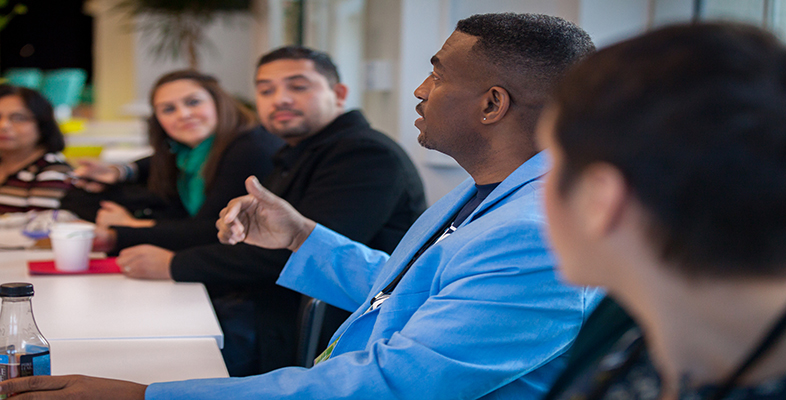Charis Ainslie
A freelance translator, Charis talks about variety in the translator’s work, CPD and drawing on peers for support with her business:
A normal day for me starts at nine after dropping the children off at school. I’ll already have checked my emails earlier in the morning so I usually know if anything urgent is waiting for me. My deadlines are often quite short – 24 or 48 hours. If possible I translate, sleep on it and review the next day, so I’ll start by reviewing anything I’ve done the day before and send off any assignments that are due. If I’m busy, I translate until three with a short break for lunch, and if necessary I’ll work in the evenings as well – it’s not ideal, but a deadline is a deadline!
Most of my work comes from two agencies in Italy. One of them sends me work almost every day. It is usually for the same client, and I translate their marketing materials. There is a regular blog, but I have also done presentations and speeches and more technical pieces. The other agency sends bigger jobs that keep me busy for a couple of weeks at a time. Once a quarter I work on a bilingual magazine, and I have recently translated a wine guide. That was the ultimate project for me! In addition, I translate for three UK agencies, and this work is more business and medical. Although I specialise in marketing and medical texts, within those subjects there is huge variety – one day I’ll be working on a French pharmaceuticals text, the next I’ll be discovering the world of Italian chandeliers!
I’ll normally have some sort of email conversation with one or more of the project managers I work with in the day – although I like working from home, it’s still nice to have that contact. Two of the UK agencies are local to me and I know the contacts personally – it’s great to get to know the people you work with. I am also looking into approaching private clients – mainly because I would like to be able to smooth out my workflow, which isn’t always predictable. That’s why I keep an action list for quieter days, to keep myself focused, and that’s when I fit in other aspects of the job – marketing, accounting, researching subject matter and terminology and so on. I was quite nervous about the accounting side of things, but have actually found it easy to get to grips with. Although I employ an accountant, I send out my own invoices at the end of each month, and chase any late payments. There have been a couple, but they have always been paid following a polite reminder! I keep a spreadsheet of my income and expenses, and try to keep everything up to date.
I do a fair amount of CPD. I try to read or watch TV in my source languages every day. This last year I have attended workshops through the ITI (Institute of Translators and Interpreters) on terminology, memoQ, corpora and transcreation. Developing my skills and learning new aspects of the job always gives me a boost – and it’s great to meet other translators.
Another great way to keep up with other translators is through the ITI’s regional and professional networks. There’s a real community out there, and hardly a day goes by when I’m not in touch with another translator. Every couple of weeks I Skype a colleague who started her business at the same time as me. We have collaborated on a big project, and hope to work again together soon, but mainly we bounce ideas off each other and share what’s happening in our week. It’s a good way to encourage each other. I also have another translator friend who has been like a mentor to me. We are in touch less frequently now, but she is always on hand to answer any questions I have. I would definitely recommend finding someone who is happy to give you advice, guidance and encouragement.
As you read through the accounts of the translators’ practice, we asked you to make a note of the sorts of tasks they do, and to look out for any common elements that they mention. Here is a model answer.
The translators mentioned a wide range of tasks. Some are the sorts of things that you probably associate more closely with translating itself, such as translating, researching subject matter and terminology, proofreading and editing and resolving queries from clients.
However, there are also a whole range of other tasks that are also essential to managing a business as a translator. These include: bidding for work, quoting and giving estimates, bookkeeping and invoicing, dealing with clients or project managers, project managing and marketing your business.
Some of the aspects of the work mentioned by several translators related to the importance of time management, especially the ability to work to tight deadlines, but also to organise yourself and multitask when necessary or, at other times, to concentrate on a specific translation task without letting yourself be distracted. Several translators mentioned the importance of taking breaks and maintaining a healthy work/life balance, which is particularly important if you work as a freelancer.
Several translators also mentioned that is important to take time to engage in CPD (continuous professional development), including keeping up your language skills. We will focus on this aspect in Section 3.
Finally, because translating as a freelancer can be a fairly lonely profession, it is also important to have contact with other professionals, through networking opportunities, but also by keeping in touch with colleagues or mentors to seek advice, guidance and encouragement.
Did anything surprise you in these accounts? Were you familiar with all the tasks that translators might carry out? Every translator’s day is different, depending on their area and level of experience, specialism and the context in which they work, and that is one of the attractive aspects of the job.

